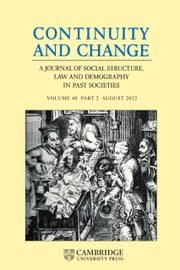Article contents
Unnatural infertility, or, whatever happened in Colyton? Some reflections on English population history from family reconstitution 1580–1837
Published online by Cambridge University Press: 30 March 2001
Abstract
It has been more than thirty years since E. A. Wrigley demonstrated, in a still-famous article, that the technique of ‘family reconstitution’, as developed in France by Louis Henry and before then applied only to French parishes and elite groups, could be used in English historical demography. Although English parish registers seldom supply nearly as much detail as found in some French ones, and many registers are incomplete owing to an interruption of registration during the Civil War – or after 1789, 1769, or even 1729 – some English parishes were discovered whose registers allow adequate identification of the participants in all demographic events. Furthermore, English parish registers have one advantage over the French: they often started in the mid-sixteenth century (not the early seventeenth).
The parish Wrigley chose to illustrate the alluring prospects for English historical demographers, as is well known, was Colyton in Devonshire. His article, however, was not merely a programmatic one setting forth the possible benefits – and costs – of family reconstitution. He had also made an unexpected discovery: that there may well have been family limitation in England (as the title of his article proclaimed) or, more specifically, in Colyton in the period from 1647 to 1719.
- Type
- Research Article
- Information
- Copyright
- © 1999 Cambridge University Press
- 2
- Cited by




